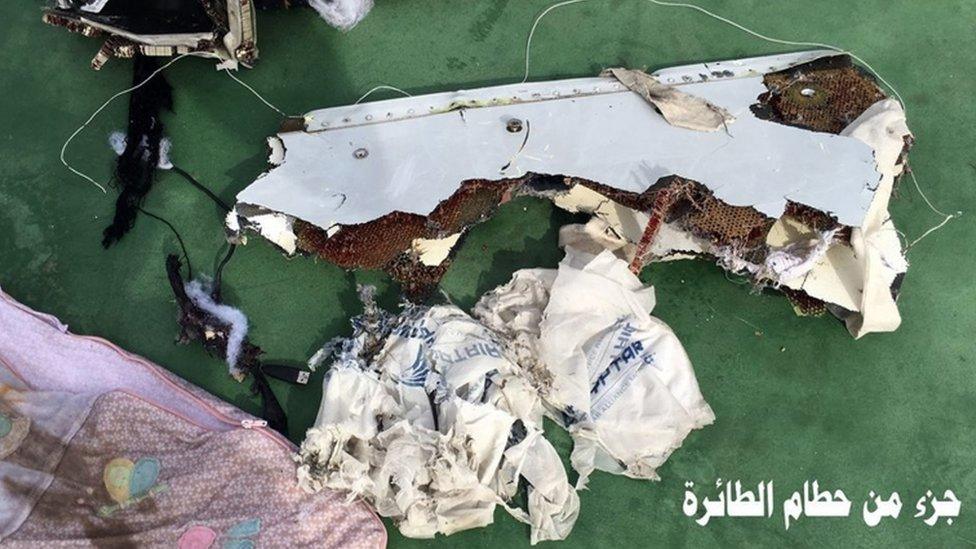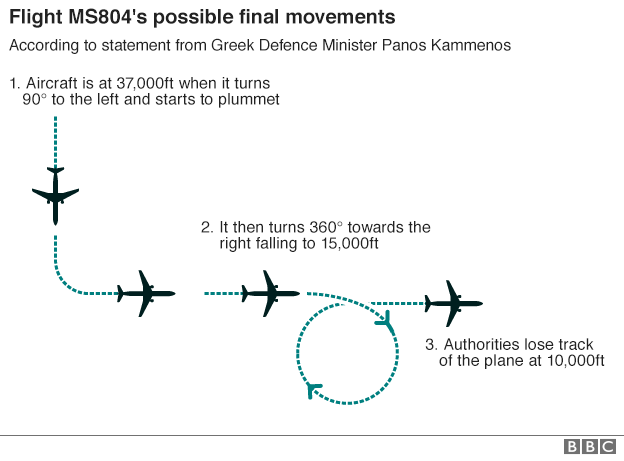EgyptAir MS804: Fires are a growing problem for airlines
- Published

Investigators say nothing has yet been ruled out in the search for the cause of the crash
I've just spoken to a man who has been a pilot for 46 years, flew the Airbus A320 for six years and has spent the past 11 years investigating fires on planes.
Capt John Cox, a Fellow at the London-based Royal Aeronautical Society, told me the known facts about what happened on the missing EgyptAir flight MS804 were confusing.
If the timings we have are right (they are still not officially confirmed), there were three minutes of smoke and heat warnings, followed by four minutes of powered flight without warnings, followed by a two minute fall.

"For a fire, that's a very short period of time. For an explosive event, like a bomb, that's a very long period of time," he says.
"It's got me and many other experts scratching their heads. There is an answer, but it's not clear yet."
Capt Cox has some sobering statistics. Every year, there are about 900-1,200 smoke-related incidents on aircraft in the US. If you double that number, you'll get a rough, global figure. The vast majority end perfectly safely, but fires have brought down planes.
"It's shockingly regular, and along with drones, it's the only part of aviation that's getting more dangerous," Capt Cox says.
He puts the rise down to two things: an increase in the number of flights, and a huge rise in people taking lithium batteries on board.
One estimate says that an airliner carrying 100 people could have 500 lithium batteries in the cabin, in cameras, laptops, tablet computers, phones, e-readers, etc.

He says crushed batteries are increasingly problematic. "Maybe someone falls asleep. Their tablet computer or phone slips down the side of the chair. They move the seat and accidentally crush the battery."
Potentially, that could start a fire.
To be clear, if you buy lithium batteries from a respectable company, they are thoroughly tested and safe, with a one in 10m failure rate. But Capt Cox says there could be 3.5bn batteries taken on aircraft throughout a year.
It only takes one to go wrong, and they pack a hell of a punch, as I reported in 2014.
The Civil Aviation Authority is warning that even a small camera battery is powerful enough to explode and start a fire
And then there are the "grey market" batteries and chargers some people buy on the cheap. They may well not have been safety tested at all.
Modern aircraft have smoke detectors, but the only automatic extinguishers are in the cargo bay. Otherwise, it's down to crew members using a hand-held fire extinguisher. There's one in the bin of each toilet, for example.
A recent paper co-written by Capt Cox , externalsays experience shows that many fires start in "inaccessible locations" - places that crew may not be able to reach.
He also made the point that the US regulator, the FAA, recently said you can never eradicate all sources of ignition on an aircraft.
Capt Cox used to fly the A320 and says it's a wonderful aircraft. He's never heard of a major fire in the front right part of the plane. And it has been flying in various forms since the late 1980s.
Many airlines also now train their staff in how to cope with a lithium battery fire.
I want to stress this again, we do not know what caused the Egyptair airliner to come down. It could be an accident. It could be more sinister. But fires on aircraft are an issue and Capt Cox is calling on the industry to do more to tackle it.
If anyone is concerned about relatives or friends following the disappearance of the flight, they can call this free number provided by EgyptAir: +202 259 89320